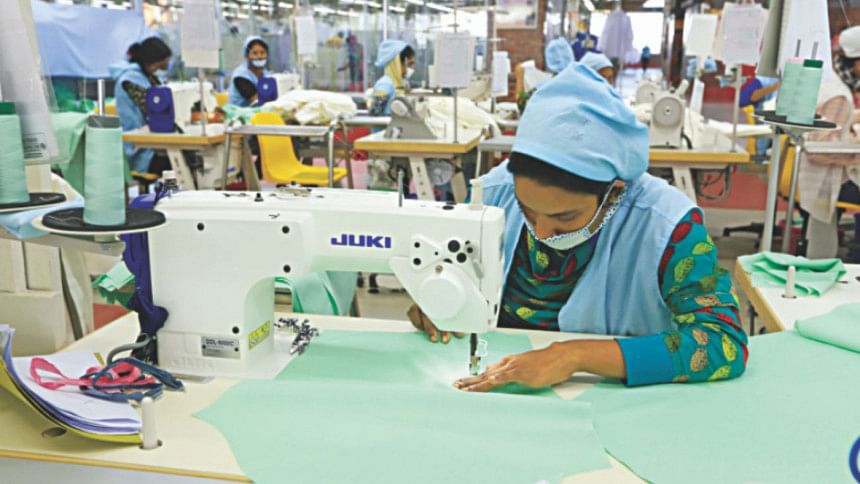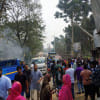Most garment workers have no contract:Survey

More than 72 percent of the garment workers in Dhaka and Gazipur do not have any appointment letters, according to a survey conducted by Manusher Jonno Foundation, a non-governmental organisation.
The picture is slightly better in Chittagong and Narayanganj: 59.49 percent of the workers do not have contracts in their hands.
“All they can show is their identity cards,” said the report titled 'Garment Workers and Rights'.
MJF surveyed 770 workers in Dhaka, Chittagong, Gazipur and Narayanganj for the study, which was unveiled yesterday at the capital's Spectra Convention Centre.
The sector employs nearly 40 lakh, 80 percent of whom are women.
Having a contract is important for garment workers when it comes to making claims, especially in cases of workplace accidents like the Rana Plaza collapse and Tazreen Fashions fire, said Mahmudul H Sumon, an associate professor at Jahangirnagar University.
Contacted, Siddiqur Rahman, president of the Bangladesh Garment Manufacturers and Exporters Association, however, denied the allegation.
“It is mandatory for all BGMEA and BKMEA factories to provide appointment letters to their workers,” he added.
Sumon, a key member of the survey, said the research aimed to raise awareness about worker rights.
According to the report, 82.9 percent of the workers in Chittagong and Narayanganj said they have never encountered any sexual violence in factories.
However, they shared many stories of harassment and violence in the factory floor during open discussion.
They reported about “very bad” behaviour from supervisors, production managers or general managers and the use of expletives for any mistake as “normal” at work.
Female workers are more exposed to such harassment, the report said.
“For delays in completing work or faults, the slurs come out so hard that they are difficult to pronounce.”
Generally, workers did not mention such behaviour as harassment.
For them something as intimidating as bodily violation or rape attempt were seen as sexual harassment or violence, the report said.
The survey did not incorporate any quantifiable data on sexual harassment in Gazipur and Dhaka.
MJF Executive Director Shaheen Anam said those who are involved in laborious work like in the garment sector are usually neglected in Bangladesh. Although things are changing due to formulation of the labour law, more needs to be done for the sector to flourish properly, she said.
Accommodation and transportation problems of female garment workers have to be addressed properly, she added.The report says 28.4 percent of the workers in Dhaka and Gazipur and 35 percent in Narayanganj and Chittagong are under the impression that they can be terminated from their jobs without any notice.
Only 35.7 percent of the workers in Dhaka and Gazipur said they have seen government factory inspectors in their premises and 60.3 percent in Narayanganj and Chittagong.
Some 83.9 percent of the survey respondents in Dhaka and Gazipur and 84.1 percent in Narayanganj and Chittagong said they are paid overtime for any extra hours at work.
In Dhaka and Gazipur, 28.7 percent workers said they get maternity leave for four months. In Narayanganj and Chittagong, the figure was 61.8 percent.
Only 15.7 percent of the workers in Dhaka and Gazipur said they are somewhat aware of the labour law; in Narayanganj and Chittagong, the percentage is 24.6 percent.
Only 5.1 percent workers have reported to have participated in some kind of trade union activities in Dhaka and Gazipur.
In Narayanganj and Chittagong, 89.8 percent of the workers said they had no relation with trade unions.
“Workers need to know the existing provisions of the labour law to become aware of their rights,” MJF said in the report. By even South Asian standards, the unionisation rate in Bangladesh is very low.
Salary should be provided as per the government's garment sector wage board decisions and a separate monitoring body should also be installed by the labour and employment ministry, it added.
State Minister for Labour and Employment Mujibul Haque Chunnu said the ministry will modernise the labour law by amending the provisions that go against the workers' interests.
The government will be building two specialised hospitals in Gazipur and Narayanganj for low-cost treatment of the workers, he also said.

 For all latest news, follow The Daily Star's Google News channel.
For all latest news, follow The Daily Star's Google News channel. 








Comments